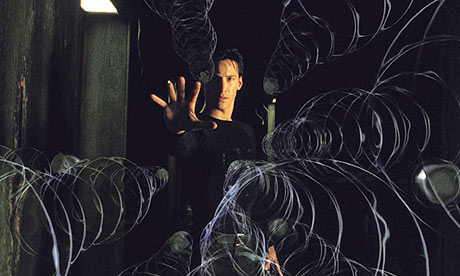[caption id="attachment_4783" align="aligncenter" width="460" caption="Neo: What are you trying to tell me? That I can dodge bullets? Morpheus: No, Neo. I'm trying to tell you that when you're ready, you won't have to. "] [/caption]
[/caption]
Predicting possible futures is one of our mind's most potent abilities. It doesn't predict one accurate future, that's precognitive mumbo jumbo. What the mind does is simulate multiple futures, based on present conditions, historical knowledge and educated guessing of external events. As the current time meets a predicted event, a new measurement updates simulated state. How well did the estimate match reality? A new set of futures is predicted given the current state of the environment as high unlikely futures are pruned.
Variation in Long and Short Term Prediction
Long and short term predictive scenarios are processed differently. The further off in the future (deeper) a simulated reality is, the more of our faculties it takes to construct. Long term predictions are highly susceptible to invalid environmental assumptions as well as behavioral and relational changes. We tend to focus thinking on a handful of major events which lead to a future state. My desired startup future path is but one example of long term prediction. Each of the stages has a correlated mental image associated with it:
- perform market research with prototypes
- find a product market fit
- refine customer acquisition funnel
- seek funding (if relevant)
- grow a profitable business
As the clock ticks the huge gaps are filled in by intermediate states with new knowledge and experience. If the environment derails enough from this desired future I'll construct a new sim^. Partnering with others who dare to dream this desired future will dramatically improve its realization probability, but add new risks*. Constantly narrowing down focus to the next step is an ongoing struggle, which leads to short term predictions.
Massively Parallel Short Term Paths
Prediction happens in parallel for immediate events, as variations of highly predictable paths are explored. The mind's perception of reality blends sensed information with internal predicted state continuously while searching for favorable outcomes.
Consider a game of racquetball as each player predicts where the ball will hit and bounce. New (or out of practice) players chase the ball. The game is not just speed and accuracy but positioning to return or kill a volley. This short term predictive process holds true for many sports. Precise prediction and optimal positioning is second nature to experienced players**.
Notes:
^= the subconscious plays a big role in simulating alternate realities, but I'm not sure how we leverage it's processing power with our conscious choices. Sleeping on a big decision is some of the best advice I've received.
*= partnering up with cofounders is a tenuous relationship pre revenue and funding. Not everyone's going to be interested in a long haul venture with me.
**= Important note the best players don't become so from reading about the sport, they practice relentlessly. Want to build a startup? Put down the book and start looking for a product market fit.
Related topics: